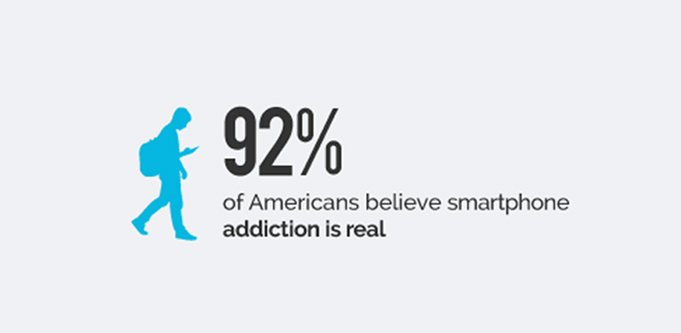By 2030, the World Health Organisation has forecast depression and anxiety will be the number one healthcare burden, costing upwards of US$1 trillion a year in many countries.
Already, studies are revealing a correlation between anxiety, depression and smartphone use — not to mention what smartphones could be doing to our neurochemical balance.
The urge to seek distraction
People call it ‘smartphone addiction’, but maybe our urge to check our mobiles or screens is also a product of affluenza. How so? Because when humans’ basic needs are largely taken care of, the urge to seek distraction is higher, because people get bored!
Technology and mass production of goods and services have widened the ‘bored effect’, so now most people have toys to play with, and therefore more means to fidget and see what the apes in other packs are up to.
How often do we touch our phones?
An interesting US survey by KDA Engineering, revealed while 60% of people think they touch their phone about 100 times or less each day, in fact, a typical user taps, touches or wipes their phone 2617 times each day!

What are all these people staring at so compulsively?
Unsurprisingly, it is texts and phone calls that are a top priority to respond to, ahead of email, messenger, and other social media apps.
It’s only been a few years since smartphones came along and already they have insidiously become ‘indispensable’. What this constant monitoring does is reinforce anxieties about ‘what’s going on out there’ and the need for affirmation.
There are upsides to monitoring what’s going on (for example, if there was a bushfire in your vicinity, you’d be wanting to quickly find the nearest exit point). Technology in the context of survival communication can save lives and prevent catastrophes from worsening.
What about the use of smartphones at work?
The study explored smartphone etiquette and found:
- 70% of people think it’s wrong to bring smartphones to meetings, but 53% do it anyway;
- 80% think it’s wrong to check phones during meetings, but 50% surreptitiously do so anyway; and
- 20% of people check their phone every 20 minutes.

Smartphone etiquette and disrespectful behaviours
It seems smartphone etiquette is eroding our behaviour both at work and socially. Watching a bored team member, or even manager, flipping through messages on a mobile in a meeting is annoying, especially when coupled with non-response to discussions.
Phubbing — a term coined in Australia to describe the habit of snubbing someone in favour of a mobile phone — is a well-documented occurrence. We probably don’t even need a University of Kent study to prove when people abruptly cease a face-to-face conversation to stare at their mobile it causes hurt and offence to others.
Mindful smartphone manners and regaining balance
Smartphone addiction is real, but like compulsive eating, we can choose to switch behaviours. It’s a question of the importance of exercising conscious good manners and moderation and being mindful how we communicate to each other.
Beyond social norms, there is compelling evidence smartphones drain our brains. For our collective and individual mind-body health, it’s vital to switch them off at regular intervals and restore our grey cells with dips into nature, performing more manual tasks (for example, handwriting rather than tapping on a laptop), making time to catch up with friends and focusing on our jobs.
Smartphones deserve their name, but in the end, it’s smarter and inherently much more sustainable if you do one simple thing: switch it off and put it away for as long as possible.
Here are some challenges to set yourself, which will be beneficial in the short- and long-term.
- Switch off your phone a couple of hours before you go to sleep (smartphones interfere with our bodies’ circadian rhythms, causing sleep deprivation and potentially impacting mental health).
- Leave your mobile in your bag or locker when attending movies, concerts, meetings and seminars. (And don’t take them to the loo — it’s distasteful hearing people’s phone conversations from the next stall!)
- Try a digital break on public transport. Read a book or newspaper, or take in the scenery while you travel.
- Go for walks and swims or exercise on a regular basis — digital detoxing is an excellent practice.
- Consider turning off notifications if possible or using flight mode for a period of time.
Value the time you spend with others. Value your health and wellbeing, and make it a work in progress.
NOW READ: Social butterflies are busy bees: How workplace friendships boost productivity
NOW WATCH: Wellbeing & Balance


And this is just the beginning because this problem cannot be solved with another app.